|
|
|
Sort Order |
|
|
|
Items / Page
|
|
|
|
|
|
|
| Srl | Item |
| 1 |
ID:
162622
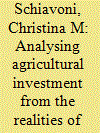

|
|
|
|
|
| Summary/Abstract |
Over the past decade, agricultural investment has been presented as a catchall solution to a converging set of global crises, often with poor rural communities as the proclaimed beneficiaries. Yet the promises of such investment, such as poverty alleviation and improved food access, are routinely at odds with realities on the ground. This article offers frameworks for analysis of agricultural investment that are grounded in the realities of small-scale food providers, drawing from two studies. The first study employs a right to food framework to identify the main channels through which food for consumption is procured by small-scale food providers and the factors impacting these channels. It draws on empirical data from within the Southern Agricultural Growth Corridor of Tanzania (SAGCOT), an investment model promised to lift rural communities out of poverty, which reflects a regional trend. Based on the shortcomings of the large-scale investments examined, the second study employs a food sovereignty framework to explore alternative forms of investment envisioned and/or already being put into practice by small-scale food providers in the SAGCOT area and elsewhere in Tanzania. While two different frameworks formed the basis of two different studies, both the studies and their frameworks are interrelated. The final section of this article makes the case for why both the right to food and food sovereignty are essential lenses for understanding agricultural investment vis-à-vis small-scale food providers and the ways in which they can serve as complementary tools for effective analysis.
|
|
|
|
|
|
|
|
|
|
|
|
|
|
|
|
| 2 |
ID:
162628
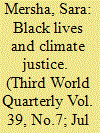

|
|
|
|
|
| Summary/Abstract |
This article shares examples of the leadership of Black communities and social movements in the struggle for climate justice, in four different parts of the world: resisting extraction and promoting community health in Nigeria; addressing extreme climate impacts and building people’s sovereignty in Haiti; confronting repression, defending territory and Mother Earth in Honduras; and cultivating community control and building a land-based movement in the US. Together, these examples have rich lessons to share around the importance of linking climate justice with racial justice; of combining strategies of resistance with those of creating alternative models; of maintaining focus on Black communities’ connections with land, territory and Mother Earth; of recognising and creating space for women’s leadership; and of intersectionality across geography and sector.
|
|
|
|
|
|
|
|
|
|
|
|
|
|
|
|
| 3 |
ID:
162620


|
|
|
|
|
| Summary/Abstract |
The global land rush and mainstream climate change narratives have broadened the ranks of state and social actors concerned about land issues, while strengthening those opposed to social justice-oriented land policies. This emerging configuration of social forces makes the need for deep social reforms through redistribution, recognition, restitution, regeneration and resistance – book-ended by the twin principles of ‘maximum land size’ (‘size ceiling’) and a ‘guaranteed minimum land access’ (‘size floor’) – both more compelling and urgent, and, at the same time, more difficult than ever before. The five deep social reforms of socially just land policy are necessarily intertwined. But the global land rush amidst deepening climate change calls attention to the linkages, especially between the pursuit of agrarian justice on the one hand and climate justice on the other. Here, the relationship is not without contradictions, and warrants increased attention as both unit of analysis and object of political action. Understanding and deepening agrarian justice imperatives in climate politics, and understanding and deepening climate justice imperatives in agrarian politics, is needed more than ever in the ongoing pursuit of alternatives.
|
|
|
|
|
|
|
|
|
|
|
|
|
|
|
|
| 4 |
ID:
162619
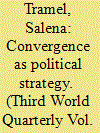

|
|
|
|
|
| Summary/Abstract |
Critical scholars and activists have now been contending with a widely recognised convergence of global crises for a decade. The issues have intersected decisively, with staple food sources proving inaccessible for the world’s poor, banks foreclosing on the most vulnerable, fuel sources causing war and impacting migration, and climate change-related instabilities shaking low-income communities to their core. At the same time, agrarian, environmental, indigenous and fishers’ movements – among others – have used this moment to converge in their own right. This article explores this intertwining of social justice movements with an eye on such interrelated challenges. Its overall objective is, on one side, to provide some broad empirical brushstrokes on the intertwining of transnational social justice movements at the local, national and regional scales as they work with and trade frameworks of food sovereignty and climate justice. On the flip side, this article offers a set of tools to analyse and understand the politics of convergence as political strategy – as a means of advancing global social justice – against the rising tide of climate-related resource grabs.
|
|
|
|
|
|
|
|
|
|
|
|
|
|
|
|
| 5 |
ID:
162616
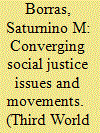

|
|
|
|
|
| Summary/Abstract |
We argue that the multiple contemporary converging crises have significantly altered the context for and object of political contestations around agrarian, climate, environmental and food justice issues. These shifts affect alliances, collaboration and conflict among and between state and social forces, as well as within and between movements and societies. The actual implications and mechanisms by which these changes are happening are empirical questions that need careful investigation. The bulk of our discussion is dedicated to the issue of responses to the crises both by capitalist forces and those adversely affected by the crises, and the implications of these for academic research and political activist work. More specifically, we explore four thematic clusters, namely (1) class and intersectionality; (2) sectoral and multisectoral issues and concerns; (3) importance of immediate, tactical and concrete issues of working people; and (4) links between national and global institutional spaces and political processes. We know only a little about the questions we framed here, but it is just enough to give us the confidence to argue that these questions are areas of inquiry that deserve closer attention in terms of both academic research and political debates and actions.
|
|
|
|
|
|
|
|
|
|
|
|
|
|
|
|
| 6 |
ID:
162618
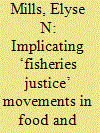

|
|
|
|
|
| Summary/Abstract |
While much debate on climate change has emerged around food, forest and land politics, the fisheries sector has only recently become more visibly implicated in these discussions. Similarly, in comparison to food and agrarian movements, fishers’ resistance to intensified mitigation efforts and resource exclusion is still significantly understudied academically, and receives little attention in political spheres. This highlights a critical gap in both food and climate politics literature, which this paper aims to present a framework for addressing. To do so, it contextualises the emergence of overlapping processes of exclusion in global fisheries, and explores the implications global food system transformations have had in the fisheries sector, and the reactions this has spurred from South African fishers. It then traces the convergence of fishers’ movements with other resource justice movements, and how this has contributed to the rise of ‘fisheries justice’. Finally, it presents four interlinked propositions – highlighting food sovereignty, resource access and conflict, climate change and mitigation, convergences between movements, and alternatives proposed by fishers – as a framework for how incorporating fisheries and fishers’ movements can broaden our understanding of transnational social movements, and expand the depth and scope of food and climate politics.
|
|
|
|
|
|
|
|
|
|
|
|
|
|
|
|
| 7 |
ID:
162626


|
|
|
|
|
| Summary/Abstract |
This reflective contribution discusses the intersection of Indigenous and Small Scale Fisheries’ (SSF) issues, and how the international SSF movement has a critical role in the broader struggle for the convergence of social justice regarding the environment, food and lifeways. I explore some of the political tensions around Indigenous and SSF struggles against global neoliberalisation of land and water resources, some of the successes and challenges of the international SSF movement, and future considerations for academic/activist ‘decolonising’ work.
|
|
|
|
|
|
|
|
|
|
|
|
|
|
|
|
| 8 |
ID:
162627
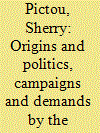

|
|
|
|
|
| Summary/Abstract |
This reflective contribution discusses the intersection of Indigenous and Small Scale Fisheries’ (SSF) issues, and how the international SSF movement has a critical role in the broader struggle for the convergence of social justice regarding the environment, food and lifeways. I explore some of the political tensions around Indigenous and SSF struggles against global neoliberalisation of land and water resources, some of the successes and challenges of the international SSF movement, and future considerations for academic/activist ‘decolonising’ work.
|
|
|
|
|
|
|
|
|
|
|
|
|
|
|
|
| 9 |
ID:
162625


|
|
|
|
|
| Summary/Abstract |
Peasants and rural communities are on the front lines of most climate catastrophes taking place nowadays worldwide; at the same time, we have been the ones taking care of our common planet over generations. This article begins with a brief overview of the current situation of land use in the world today and links it to climate issues. It then describes some of the solutions to climate threats being negotiated between national governments and the private sector. It then highlights solutions that communities are already implementing and concludes with the reasons why systemic change is needed in order to achieve agrarian and climate justice.
|
|
|
|
|
|
|
|
|
|
|
|
|
|
|
|
| 10 |
ID:
162617
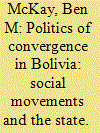

|
|
|
|
|
| Summary/Abstract |
The convergence of social movements in Bolivia was a decisive factor in bringing President Evo Morales and the Movement Towards Socialism (Movimiento al Socialismo, hereafter MAS) to power in 2006. Yet in recent years, this convergence has become fraught with internal tensions as the state’s extractivist development model and promises for plurinationalism and alternative forms of development reveal fundamental contradictions. This paper traces the formation of social movement alliances over time, revealing their power to effect change and their strength when there is unity in diversity. Rather than ‘neoliberalism’ which represented the injustice frame and united identity- and class-based politics during the rise of the MAS, the single greatest threat to the indigenous, peasants, originarios, women and the youth in the current context is extractivism.
|
|
|
|
|
|
|
|
|
|
|
|
|
|
|
|
| 11 |
ID:
162621
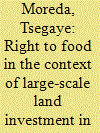

|
|
|
|
|
| Summary/Abstract |
Since the global food crises of 2007, smallholder farmers, pastoralists, indigenous peoples and other rural groups in many developing countries have seen their access to land, water and forest resources being threatened and reduced due to the acquisition of those resources by other actors – acquisitions that may have been promoted by state policies. Taking up the case of Ethiopia, this article aims to explore the implications of large-scale agricultural investments for local food security and the right to food. The article argues that in the context of the recent and ongoing large-scale agricultural investments driven primarily by the state, the interpretation and realisation of the right to food becomes a politically contested issue and that such investments run counter to implementing the state’s obligation to protect local people’s access to and procurement of adequate food. It argues that the large-scale agricultural investments both condition and pervert the realisation of food security.
|
|
|
|
|
|
|
|
|
|
|
|
|
|
|
|
| 12 |
ID:
162623


|
|
|
|
|
| Summary/Abstract |
The current configuration of global land politics – who gets what land, how, how much, why and with what implications in urban and rural spaces in the Global South and North – brings disparate social groups, governments and social movements with different sectoral and class interests into the issue of natural resource politics. Governance instruments must be able to capture the ‘political moment’ marked by the increasing intersection of issues and state and social forces that mobilise around these. This paper looks at whether and how the Voluntary Guidelines on Responsible Governance of Tenure of Land, Fisheries and Forests in the Context of National Food Security (also known as the TGs) passed in 2012 in the United Nations Committee for Food Security (CFS) can contribute to democratising resource politics today. This work puts forward some initial ideas about how systematic research into the TGs can be done more meaningfully.
|
|
|
|
|
|
|
|
|
|
|
|
|
|
|
|
| 13 |
ID:
162624


|
|
|
|
|
| Summary/Abstract |
In 2012, with the adoption of the Voluntary Guidelines on the Responsible Governance of Tenure of Land, Fisheries and Forests in the Context of National Food Security (or TGs), the UN Committee on World Food Security (CFS) established a new international standard on natural resource governance. After adoption, the challenge is for these guidelines to be implemented and used. However, no law is self-interpreting or self-implementing, and so how states will interpret and implement these new guidelines cannot be taken for granted. This is especially true in the current global context of land grabbing driven, in many cases, by alliances of state and capital. Consequently, subaltern people, for whom rights in relation to the natural resources on which they depend remain out of reach, face the challenge and potential opportunity of making use of the TGs to recalibrate the political-legal terrain in favour of human rights and democratic control of land and other natural resources.
|
|
|
|
|
|
|
|
|
|
|
|
|
|
|
|
|
|
|
|
|